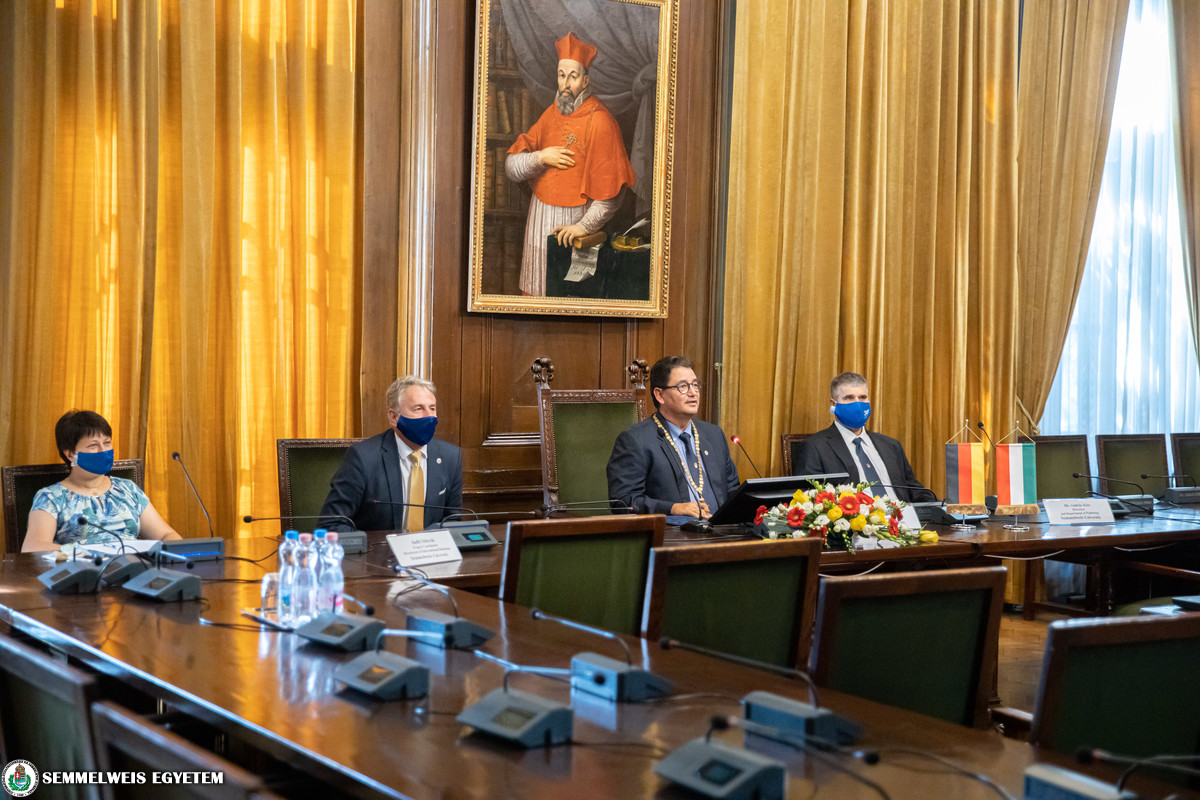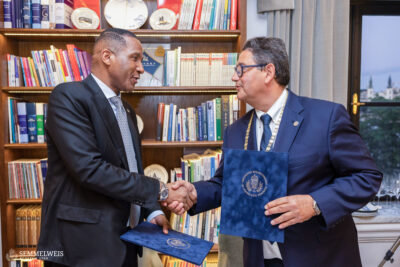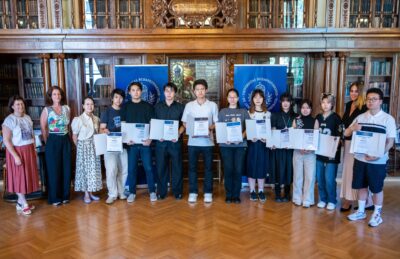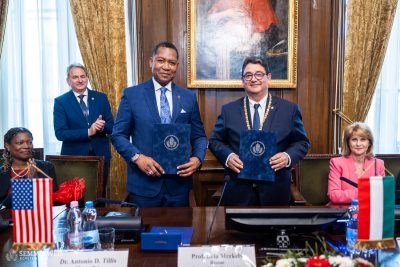Collaboration between Semmelweis University and one of its oldest partners, the University of Freiburg (Albert-Ludwigs Universität), has been renewed for an additional five years after extensive preparatory work. As per the agreement, scientific cooperation, mobility of students and researchers will continue and further joint events may be organised.
After months of comprehensive and careful preparation, the leaders of Semmelweis University and the University of Freiburg signed the agreement on 11 September.
The history of the collaboration of the two universities dates back to 1983 when Semmelweis University and the University of Freiburg signed a bilateral agreement on scientific cooperation. The objective of the agreement was to provide a firm basis for scientific collaboration through personal and institutional relations; to facilitate student, researcher and staff mobility; to support joint research and education and to further strengthen and develop international scientific collaboration.
The cooperation has proved to be successful in many areas since the agreement was signed nearly 40 years ago. Scientific collaboration has been realised in various ways, such as joint research projects, professional cooperation between institutions and departments that is marked by a high number of joint research papers. Student and researcher mobility has been operating successfully for a long time and several joint events have been organised, such as the biennial scientific symposium of the University of Freiburg, the University of Heidelberg and Semmelweis University.
Before signing the renewed agreement on the guidelines and content for the next five years on 11 September, Dr. Hans-Jochen Schiewer, Rector of the University of Freiburg, Dr. Norbert Südkamp, Dean of the Faculty of Medicine at Freiburg, Dr. Martin Werner, Rector’s Commissioner for international relations, Dr. Béla Merkely, Rector of Semmelweis University, Dr. András Kiss, Rector’s Commissioner for German relations, Dr. Marcel Pop, Director of International Relations and Judit Szlovák, Project Coordinator of German Relations had spent months on extensive preparatory work.
The signing ceremony took place online due to the special circumstances. By signing the agreement, the specific conditions, potential new areas of cooperation and the directions for further development were laid down for the next 5 years.
In his opening speech, Dr. Béla Merkely, Rector expressed his pleasure that the signing ceremony could take place despite the epidemic. In addition to the signing ceremony of the agreement for the next five years, a personal meeting had originally been planned for 11-12 September including a two-day scientific symposium. Both universities have expressed their willingness to hold the symposium at a later date. The Rector of Semmelweis University emphasized that they considered it important to maintain the well-functioning forms of the cooperation and to identify new areas for further development, thus making the partnership more intense.
 Dr. Hans-Jochen Schiewer, Rector of the University of Freiburg said that despite the onset of the coronavirus epidemic at the end of last year, the ties between the University of Freiburg and Semmelweis University have been strengthened and relations have become more dynamic and intense. Not even the epidemic was in the way of the extension and development of the already existing areas of cooperation. According to Dr. Norbert Südkamp, Dean of the Faculty of Medicine at the University of Freiburg, one of the most significant results is the agreement on the organisation of scientific symposia on a yearly basis. The Rector of the University of Freiburg was glad to mention that may German colleagues wanted to participate in the September event despite the special circumstances. Although the symposium was postponed due to the coronavirus, all the particpants believe that the event can be held at a later date with the same programme. The participants from the University of Freiburg would have included Dr. Martin Czerny, Chief Physician of the Department of Cardiovascular Surgery who would have been head of the Cardiovascular Section; Dr. Ingo Hilgendorf, Deputy Director of the Department of Cardiology and Angiology, heading the Basic Research Section; Dr. Stefan Fichtner-Feigl, Director of the Department of General Abdominal Surgery; Dr. Fabian Bamberg, Director of the Department of Diagnostic and Interventional Radiology; Dr. Martin Werner, Rector’s Commissioner for relations with Semmelweis University and Director of the Department of Clinical Pathology; Dr. Oliver Schilling, Professor of the Department of Clinical Pathology; Dr. Christian Gratzke, Director of the Department of Urology and Dr. Dominik von Elverfeldt, Professor of the Medical Physics Section of the Department of Radiology. The lecturers from Semmelweis University would have been Dr. Béla Merkely, Rector and Director of the Városmajor Heart and Vascular Centre; Dr. Miklós Kellermayer, Dean of the Faculty of Medicine and Director of the Department of Biophysics and Radiation Biology; on behalf of the 2nd Department of Pathology Dr. Andráss Kiss, Director Dr. Gábor Lotz, Associate Professor; Dr. Pál Maurovich Horvát, Director of the Department of Radiology and the Department of Medical Imaging; Dr. Attila Szijártó, Director of the 1st Department of Interventional Gastroenterology; Dr. Domokos Máthé, senior research fellow at the Department of Biophysics and Radiation Biology and Dr. Tamás Széll, clinical specialist and Dr. Tibor Szarvas, senior research fellow from the Department of Urology.
Dr. Hans-Jochen Schiewer, Rector of the University of Freiburg said that despite the onset of the coronavirus epidemic at the end of last year, the ties between the University of Freiburg and Semmelweis University have been strengthened and relations have become more dynamic and intense. Not even the epidemic was in the way of the extension and development of the already existing areas of cooperation. According to Dr. Norbert Südkamp, Dean of the Faculty of Medicine at the University of Freiburg, one of the most significant results is the agreement on the organisation of scientific symposia on a yearly basis. The Rector of the University of Freiburg was glad to mention that may German colleagues wanted to participate in the September event despite the special circumstances. Although the symposium was postponed due to the coronavirus, all the particpants believe that the event can be held at a later date with the same programme. The participants from the University of Freiburg would have included Dr. Martin Czerny, Chief Physician of the Department of Cardiovascular Surgery who would have been head of the Cardiovascular Section; Dr. Ingo Hilgendorf, Deputy Director of the Department of Cardiology and Angiology, heading the Basic Research Section; Dr. Stefan Fichtner-Feigl, Director of the Department of General Abdominal Surgery; Dr. Fabian Bamberg, Director of the Department of Diagnostic and Interventional Radiology; Dr. Martin Werner, Rector’s Commissioner for relations with Semmelweis University and Director of the Department of Clinical Pathology; Dr. Oliver Schilling, Professor of the Department of Clinical Pathology; Dr. Christian Gratzke, Director of the Department of Urology and Dr. Dominik von Elverfeldt, Professor of the Medical Physics Section of the Department of Radiology. The lecturers from Semmelweis University would have been Dr. Béla Merkely, Rector and Director of the Városmajor Heart and Vascular Centre; Dr. Miklós Kellermayer, Dean of the Faculty of Medicine and Director of the Department of Biophysics and Radiation Biology; on behalf of the 2nd Department of Pathology Dr. Andráss Kiss, Director Dr. Gábor Lotz, Associate Professor; Dr. Pál Maurovich Horvát, Director of the Department of Radiology and the Department of Medical Imaging; Dr. Attila Szijártó, Director of the 1st Department of Interventional Gastroenterology; Dr. Domokos Máthé, senior research fellow at the Department of Biophysics and Radiation Biology and Dr. Tamás Széll, clinical specialist and Dr. Tibor Szarvas, senior research fellow from the Department of Urology.
The leaders of both universities urged the organisation of a personal meeting. As Dr. Béla Merkely, Rector of Semmelweis University and Dr. Hans-Jochen Schiewer, Rector of the University of Freiburg observed, they have to join forces in the fight against the coronavirus, as it is also important to set up joint projects as well as to exchange research information and experiences in this area.
Judit Szlovák
Photo: Attila Kovács – Semmelweis University
Translation: Ágnes Raubinek


